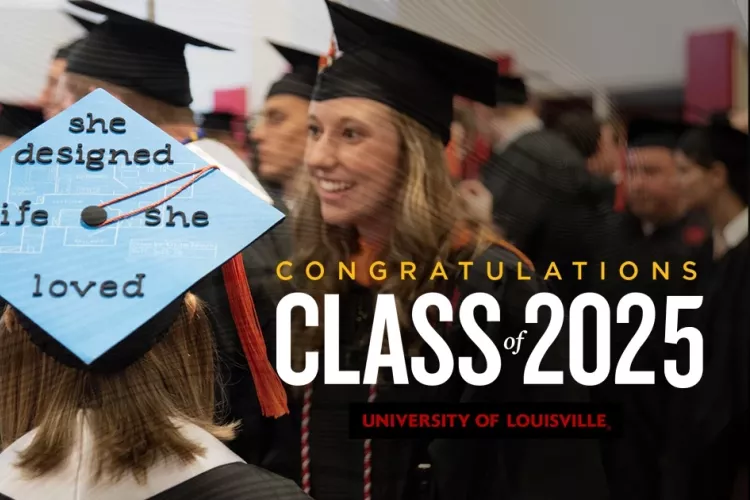UofL women’s leadership event generates record crowd
October 2, 2024The seventh annual Pathways Women’s Leadership Conference – held last week at the SAC – generated a record crowd of 277 women and their allies from across campus.
The keynote speaker for the event was Valerie Young, who wrote “The Secret Thoughts of Successful Women” and who is a nationally renowned expert on imposter syndrome. She said imposter syndrome affects about 70% of all people and is especially high in academia.
“Fundamentally, what we’re talking about is confidence,” she said. “We have these feelings despite our accomplishments. We explain away our success, whether it’s through luck, timing, connections, personality, diversity hire, or something else. Being found out is our biggest fear.”
There are a number of factors behind why so many people feel like frauds – situational, organizational, culture, etc. Her mission is to normalize imposter syndrome and provide people with the right tools to overcome it.
Men and women tend to approach imposter syndrome differently, Young said. More women tend to lack confidence and have a harder time resonating with the word “successful.” They’re also more likely to underestimate themselves and internalize their failures.
Conversely, men may feel pressured to be internally confident, even when they don’t feel it. They’re also more likely to externalize failure, deflecting blame.
To illustrate the difference between men and women, a study by Hewlett-Packard found that for job postings that included 10 criteria – men, on average, would apply if they had six out of 10. Women would not apply unless they had all 10.
"Success is complicated. We're all successful, everyone in this room," she said. "We just have to define what that means."
Young said there are five types of imposters:
- The perfectionist, where 99 times out of 100 they will feel like a failure
- The expert, who feels that they never really know the answer
- The genius, who feels an erosion of confidence if they don’t grasp something quickly and easily
- The soloist, who feels that needing help evokes shame
- The super woman, who expects to excel at everything
To unlearn these behaviors, Young said it’s important to talk about imposterism, and to normalize it.
“The only way to stop feeling like an imposter is to stop thinking like an imposter,” she said. “Reframe it, the way a non-imposter does. That means reframing failures and mistakes. You can be disappointed if you fail, but you shouldn’t be ashamed if you did your best. Non-imposters seek out criticism. They don’t personalize it."
It’s also important to reframe what it means to be competent, she adds.
“Non-imposters know they can’t be perfect at everything,” Young said. “What’s important is to know the more you do anything, the better you’ll get at it over time. And, regardless of how confident you feel, you have to keep going. Everyone loses when bright people play small.”
President Neeli Bendapudi also addressed the crowd, acknowledging the importance of diversity, especially in academia.
“It is so important to have leadership that reflects who we serve,” she said.
Bendapudi also touched on the glass cliff theory, in which women tend to be appointed to leadership roles when “things are going really, really bad.” This means the likelihood of failure is also greater.
Bendapudi closed with two pieces of advice:
- “As a manager, you need to be super explicit about what you want. Don’t assume people know.”
- “When you have a really busy day, wear comfortable shoes!”
Allison Ball, Kentucky State Treasurer, provided a discussion about financial empowerment, noting that this is an area where women’s leadership can make a major difference.
The program was sponsored by Commonwealth Credit Union, and Karen Harbin, CCU’s president and CEO, opened things up with a brief overview of her 33-year career. She was followed by Provost Beth Boehm, who offered advice to the crowd.
“Sometimes people ask how I got here. It took me 32 years. It was not a meteoric rise,” Boehm said. “I was always the one who rolled up my sleeves and did the work. There is no magic wand that makes your vision a reality. It takes hard work.”
Boehm added that it’s ok to say “no” every now and then, however.
“There are three reasons I give my time to serve – if I felt like I could contribute; if I felt like I could learn something; and if I had the time,” she said. “There are talkers and there are doers. Be a doer.”
Karan Chavis, chief of staff at the School of Medicine, threw out some statistics for the group to underscore the importance of having events such as the Pathways Leadership Conference. Those stats include:
- 5% of the Top 500 S&P CEOs are women
- 8% of congressional seats are held by women
- In 2018, women’s average salaries were 85 cents to men’s dollar
- In Kentucky, women will achieve pay equity in 2069



